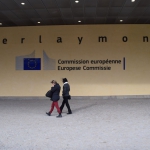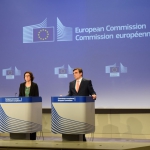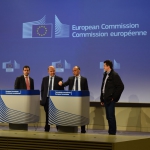European Commission – 14 January 2020
Following the proposal of President von der Leyen, Mrs Ilze Juhansone has been appointed as the Commission’s new Secretary-General with immediate effect.
Ilze Juhansone will be the eighth Secretary-General of the European Commission to assume this post. She has served as Deputy Secretary-General of the Commission responsible for interinstitutional and external relations since October 2015.
Ilze Juhansone joined the Latvian Foreign Service in 2008 and served, among others, as Under-Secretary of State and the Head of the European Union Directorate. She was the Permanent Representative of Latvia to the European Union as of March 2011. Prior to the Foreign Ministry, Ilze Juhansone held senior positions in Latvia’s Ministries of the Interior and Justice.
College of Commissioners – 31 January 2018
The European Commission adopted a new Code of Conduct.
- Post-office activities: The new Code of Conduct extends the “cooling-off” period from currently 18 months to two years for former Commissioners and to three years for the President of the Commission. During the cooling-off period, former Members of the Commission need to inform the Commission before taking up a new job and will also be subject to restrictions in certain activities, such as lobbying members or staff of the Commission.
- Preventing conflicts of interest: The new Code of Conduct defines, for the first time, what a “conflict of interest” is and sets as a principle not only that Commissioners avoid situations of conflict of interest, but also situations that might be seen this way. In case former Commissioners intend to work in areas which are related to their former portfolios, the Independent Ethical Committee needs to be consulted first. As of now, both the Commission’s decisions and the Committee’s opinions related to such decisions will be made public.
- Financial interests: Stricter rules will also apply to the financial interests of Commissioners. They will have to declare investments above €10,000 irrespective of whether there could be a conflict of interest. In case of a conflict of interest due to a Commissioner’s particular asset, the President will be able to request its divestiture or placement in a blind trust. Commissioners should update their declarations at the beginning of each year.
- Transparency and accountability: Commissioners must travel in the most cost-effective manner. Information about each Commissioner’s travel expenses will be published every two months. The first such publication is scheduled for the end of February 2018.
- Enforcing the rules: In the application of the Code, the College will be assisted by a new reinforced Independent Ethical Committee, which will be able to give advice on all ethical issues and make recommendations related to the Code. In case of a breach of the Code which does not justify taking the matter to the Court of Justice, the Commission can express a reprimand and make it public.
- Allowing Commissioners to be candidates to European Parliament elections without having to take a leave of absence: President Juncker’s proposal from November 2016 will become applicable as soon as the European Parliament agrees to the updated Framework Agreement between the European Parliament and the Commission. A vote in the European Parliament is scheduled for 7 February 2018.
Representation of Interests – 28 September 2016
The European Commission proposed a mandatory Transparency Register covering all three EU institutions – the European Parliament, the Council and the Commission.
Under these proposals, meetings with decision-makers from the three institutions would become conditional on prior registration in the Transparency Register. Registrants who fail to comply with the Code of Conduct could face temporary suspension of their interactions with the institutions or removal from the Register.
A first Transparency Register was established jointly by the European Parliament and the Commission in 2011; it was updated through an Interinstitutional Agreement (IIA) agreed in April 2014 and currently applies only to the two institutions.The current voluntary Register includes over 9,800 entities bound by the Code of Conduct. Registrants range from public affairs consultancies and law firms to trade and professional associations, NGOs, religious organisations and academic organisations.
Expert Groups – 1st June 2016
The Commission has adopted new rules on the creation and functioning of the advisory expert groups which provide external expertise to help inform the policy-making process. The new rules are binding on all Commission departments.
Under the new rules, it becomes mandatory for Commission departments to select all expert group members through public calls for applications – except those representing Member States, third countries, and EU and international bodies. These calls must be published on the Register of Expert Groups and must clearly outline the selection criteria, including the required expertise and interest groups targeted.
The revised rules require Commission departments to make available relevant documents including agendas, complete and meaningful minutes and expert submissions. In case of adoption of an expert group position through a vote, minority opinions expressed by experts can also be made public if they so wish.
Commission departments will have to carry out specific conflict of interest assessments for these experts. Their Declarations will be published on the Register of Expert Groups.
Around 800 expert groups currently advise the Commission across all policy areas. Expert group members can be appointed in an individual capacity or can represent Member States, third countries, EU and international bodies, business, trade unions, civil society, academia or other interests.
Expert groups are used in the preparation of new legislation or delegated and implementing acts, in the implementation of existing laws, or in developing strategic policy orientations more generally. These groups do not take any decisions – their role is purely advisory – but they may formulate opinions or recommendations and submit reports to the Commission. The Commission and its officials remain fully independent regarding the way they take into account the expertise and views gathered from these expert groups.
European Citizens Initiatives
In the past three years, an estimated six million Europeans have supported European Citizens’ Initiatives (ECI).
Under the rules set out in the Lisbon Treaty, if a Citizens’ Initiative collects over one million statements of support (signatures), in an area where the European Commission has competence to propose law, then the Commission must formally discuss the issue and publish a response in the form of a Commission Communication.
The Report shows that, in the past three years, 51 requests to launch an initiative have been received. From these 51 requests, 31 were in fields of Commission competence and have been registered; 3 have so far reached the threshold of one million signatures; 12 reached the end of their collection period without reaching the threshold; 3 are still collecting statements of support; and 10 were withdrawn by the organisers.
Statements of support have been received from citizens in all 28 EU Member States. However, there are situations where some citizens have not been able to support Initiatives due to diverging Member States’ requirements.
The creation of online collection systems for signatures has also proved difficult for organisers and in some cases impacted on the time available to collect statements of support. The Commission has offered temporary hosting solutions to organisers and recently commissioned a study on ECI Information and Communication Technology impacts to seek a sustainable solution.
The European Citizens’ Initiative was introduced by the Lisbon Treaty. The rules and procedures are set out in a Regulation adopted by the European Parliament and Council on 16 February 2011. The Regulation started to apply on 1 April 2012. The Regulation foresees that by 1 April 2015 and every three years thereafter the Commission shall present a report on its application.
Lobbying
A new version of the EU Transparency Register has been been launched following joint work by the European Commission and the European Parliament. This ‘second generation’ of the Register implements the provisions of the revised Inter-institutional Agreement signed between the European Parliament and the European Commission in April 2014.
The new system brings changes to the way human resources invested in lobbying are declared, requires additional information about involvement in EU committees, forums, intergroups or similar structures, and legislative files currently followed; it also extends the requirement to declare estimated costs related to lobbying to all registrants.
Additionally, a streamlined ‘alerts & complaints’ procedure allows for greater scrutiny and more efficient treatment of allegedly misleading information, and new incentives are given to increase the added value of registering, such as a requirement to register for all those seeking to meet with Commissioners, Cabinet Members or Directors-General or for any organisation wishing to speak at hearings organized by the European Parliament.
A more user friendly website improves the public interface and provides for a more straightforward registration process with guidance provided in a step-by-step approach.
The Juncker Commission intends to make its own proposal in 2015 for a mandatory register of lobbyists covering the Commission, the European Parliament and the Council. The preparation of this proposal is the responsibility of First Vice-President Timmermans.
Pictures (credit: Gaël du Bouëtiez)
The pressroom of the European Commission is open every day at noon to the 1.000 accredited journalists, who can ask any question to the Commissioners and their spokespersons.
Economic and Financial Affairs Commissioner Pierre Moscovici came early before of the meeting to test the micros…







